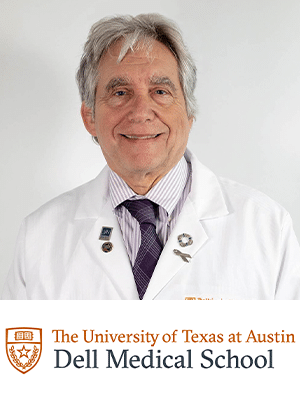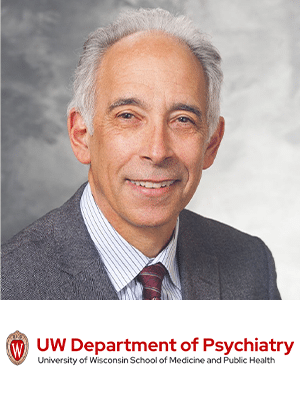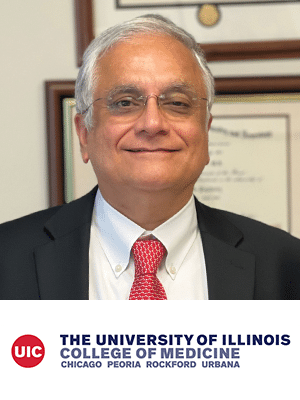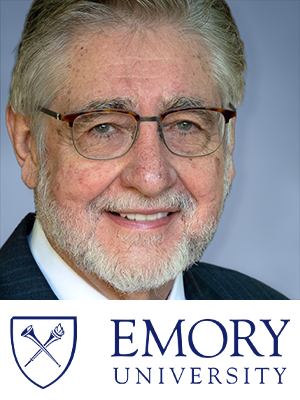Charles B. Nemeroff, MD, PhD
Matthew P. Nemeroff Endowed Chair, Department of Psychiatry & Behavioral Sciences Director, Institute for Early Life Adversity Research Co-Director, Center for Psychedelic Research & Therapy President, Anxiety and Depression Association of America (ADAA)
Charles B. Nemeroff, MD, PhD is Professor and Chair of the Department of Psychiatry and Behavioral Sciences at the Dell Medical School, University of Texas at Austin. He also directs the Institute for Early Life Adversity Research within the department as part of the Mulva Clinic for the Neurosciences, and co-directs the Center for Psychedelic Research and Therapy. Prior to joining Dell Medical School, Dr. Nemeroff was chair of the Department of Psychiatry at Emory University School of Medicine in Atlanta, Georgia. Immediately prior to assuming the Chair at University of Texas, Dr. Nemeroff was Chairman of Psychiatry and Behavioral Sciences and clinical director of the Center on Aging at the University of Miami Miller School of Medicine in Miami, Florida. He received his medical degree and doctorate degrees in neurology from the University of North Carolina School of Medicine. He has published more than 1,100 research reports and reviews, and grants from the National Institutes of Health currently support his research. But he still finds time to evaluate and treat patients.
Dr. Nemeroff has received a number of research and education awards including the Mrazek Award in Psychiatric Pharmacogenomics, Kempf Award in Psychobiology, the Samuel Hibbs Award, Research Mentoring Award, Judson Marmor Award and the Vestermark Award from the American Psychiatric Association (APA), the Mood Disorders Award, Bowis Award and Dean Award from the ACP and the Julius Axelrod Award for mentoring from the ACNP. He was elected to the National Academy of Medicine in 2002. He was also named Alumnus of the Year from the University of North Carolina and from the UNC Medical School. Nemeroff has also served on the Mental Health Advisory Council of National Institute of Mental Health and the Biomedical Research Council for NASA; is co-editor in chief (with Alan F. Schatzberg, MD) of the Textbook of Psychopharmacology, published by the APA Press and now in its Fifth Edition; and is the co-editor in chief of a new journal published by Elsevier, Personalized Medicine in Psychiatry. He is President of the Anxiety and Depression Association of America (ADAA).
Dr. Nemeroff is a member of the APA Council on Research and Chairs both the APA Research Colloquium for Young Investigators and the APA Work Group on Biomarkers and Novel Treatments. His research is focused on the pathophysiology of mood and anxiety disorders, focusing on the role of child abuse and neglect as a major risk factor.


Ned H. Kalin, M.D.
Hedberg Professor and Chair of the Department of Psychiatry at the University of Wisconsin School of Medicine and Public Health
Ned H. Kalin, M.D. is Hedberg Professor and Chair of the Department of Psychiatry at the University of Wisconsin School of Medicine and Public Health. He is the Director of the HealthEmotions Research Institute and the Lane Neuroimaging Laboratory, a Professor in the Department of Psychology at the University of Wisconsin, and an affiliate scientist at the Wisconsin Regional Primate Center and the Harlow Primate Laboratory. He serves as the principal investigator for several ongoing NIH funded research projects and has published over 250 peer-reviewed articles related to the adaptive and maladaptive expression of emotion and anxiety, and the childhood risk to develop anxiety disorders and depression. His research focuses on uncovering basic mechanisms that relate stress to the development of psychopathology and to understanding the mechanisms that cause some children to be vulnerable for the development of anxiety and depression. The aim of his research is to develop novel, neuroscientifically-informed, strategies for the treatment of anxiety disorders with a special focus on early life and preventive interventions for young children. In addition to his research activities, he treats patients who suffer from anxiety and depression who are refractory to standard treatment.
Dr. Kalin earned his medical degree from Jefferson Medical School in Philadelphia, Pennsylvania, did his residency in the Department of Psychiatry at the University of Wisconsin, and a fellowship in Neuropsychopharmacology at the National Institute of Mental Health. Dr. Kalin is board certified by the American Board of Psychiatry and Neurology. He is a Fellow Emeritus of the American College of Neuropsychopharmacology and a Fellow of the American College of Psychiatry. He has been recognized for numerous awards including the 1985 A.E. Bennett Award for basic science research in biological psychiatry, 2005 Edward A. Strecker Award, 2007 American College of Psychiatrists Award for research in mood disorders, 2007 Gerald Klerman Senior Investigator Award, 2015 Anna-Monika Prize of the European College of Neuropsychopharmacology, Institute of Living/Hartford Hospital 2020 C. Charles Burlingame Award for compelling contributions to the field of psychiatry throughout his career , and most recently the International Society of Psychoneuroendocrinology Bruce McEwen Lifetime Achievement Award.. In 2013 he was inducted as a Fellow in the American Association for the Advancement of Science, and in 2015 he was elected as a member of the National Academy of Medicine. In 2017, Dr. Kalin was inducted as a Distinguished Life Fellow of the American Psychiatric Association. He has served as President of the International Society of Psychoneuroendocrinology and President of the Society of Biological Psychiatry, as a member of the National Advisory Mental Health Council and as Co-Editor for the international journal, Psychoneuroendocrinology. In 2019, Dr. Kalin was appointed as the Editor-in-Chief of the American Journal of Psychiatry and continues to serve as the editor today.
Anand Kumar, MD
Department Head, Psychiatry | Lizzie Gilman Professor
Anand Kumar, MD, is the Head of the Department of Psychiatry and Lizzie Gilman Professor and at the University of Illinois at Chicago. Dr. Kumar received his medical degree from Madras Medical College in Madras, India. He completed his Residency training in Psychiatry at the University of Michigan, Ann Arbor, and subsequently served as a Medical Staff Fellow in the Laboratory of Neurosciences at the National Institute on Aging.
Dr. Kumar’s research focuses on late-life depression and mental disorders of the elderly, including Alzheimer’s disease. He has been consistently funded by NIH research grants for over 18 years and is author or co-author of more than 100 peer-reviewed journal articles and book chapters. His papers have been published in prestigious journals including the American Journal of Psychiatry, the Archives of General Psychiatry, and Proceedings of the National Academy of Sciences.
Dr. Kumar has built a research and clinical powerhouse in Chicago, with UIC Department of Psychiatry currently ranked 24th in the nation and 1st in Illinois for NIMH funding. Combined with outstanding clinical services, superb mentoring, and diverse patient populations, UIC residents have a solid foundation onto which continued acquisition of knowledge can be built.
Dr. Kumar is renowned in Geriatric Psychiatry as an educator and mentor; his former trainees have been awarded clinical, research, and/or training positions at such esteemed institutions as UCLA, Brown, Emory, Duke, Johns Hopkins, Harvard, and Yale University. Recently, Dr. Kumar was awarded the Jack Weinberg Award for Geriatric Psychiatry from the American Psychiatric Association.


Alan Schatzberg, MD
Kenneth T. Norris, Jr. Professor of Psychiatry and Behavioral Sciences Chair, Stanford University School of Medicine - Psychiatry and Behavioral Sciences (1991 - 2010), Director, Stanford Mood Disorders Center (2009 - Present)
Dr. Alan F. Schatzberg, MD was the 136th president of the American Psychiatric Association (2009–2010). He also served as the President of the Society of Biological Psychiatry (2006 – 2007 as well as the President of the American College of Neuropsychopharmacology (1999 – 2000).
Since 1991, Dr. Schatzberg has served several roles at the Stanford University School of Medicine including as the Kenneth T. Norris, Jr. Professor of Psychiatry and Behavioral Sciences (Present), Chair of Psychiatry and Behavioral Sciences (1991 – 2010), and Director of the Stanford Mood Disorders Center (2009 – Present). Prior to Stanford, Dr. Schatzberg served in the United States Air Force before joining the faculty of Harvard Medical School and the staff of McLean Hospital. At McLean Hospital, he held several important positions including Service Chief, Interim Psychiatrist-in-Chief, Co-Director of the Affective Disorders Program (with Dr. J. Cole), and Director of the Depression Research Facility. In 1988, he became Clinical Director of the Massachusetts Mental Health Center and Professor of Psychiatry at Harvard Medical School.
Dr. Schatzberg has been an active investigator in the biology and psychopharmacology of depressive disorders. He has authored over 700 publications and abstracts, including Schatzberg’s Manual of Clinical Psychopharmacology, whose ninth edition appeared in 2019 and which is co-authored by Dr. Charles DeBattista. He also co-edited with Dr. Charles B. Nemeroff the Textbook of Psychopharmacology whose fifth edition appeared in 2017. He was Co-Editor-in-Chief of the Journal of Psychiatric Research and sits on many other editorial boards as well, including Journal of Clinical Psychopharmacology, Psychoneuroendocrinology, Biological Psychiatry, and others. In 2003, he was elected into the National Academy of Medicine. Dr. Schatzberg has also led 7+ clinical trials and has received three honorary doctorate degrees. He is one of the foremost psychiatry experts, evaluating and successfully treating thousands of patients. Dr. Schatzberg is a revered mentor to his many psychiatry residents at Stanford and serves as a cornerstone in training the country’s next best psychiatrists.
Dr. Schatzberg received his MD at the NYU Grossman School of Medicine (1968) and his MS at Harvard University (1988). He received his board certification in Psychiatry in 1975 after completing his fellowship at the Harvard Medical School (1972) and completing residencies at the Massachusetts Mental Health Center (1969-1972) and Southard Clinic (1971-1972), where he served as Chief Resident.
Barbara Coffey, MD
Professor and Chair of the Department of Psychiatry and Behavioral Sciences, Division Chief of Pediatric and Adolescent Psychiatry
Barbara J. Coffey, MD, MS is Professor and Chair of the Department of Psychiatry and Behavioral Sciences at the University of Miami Miller School of Medicine. She has held the position of Chief of the Division of Child and Adolescent Psychiatry since October 1, 2017 and Director of the University of Miami Tourette Association of America (TAA) Center of Excellence since July 1, 2019. Dr. Coffey is an internationally recognized specialist in tics, Tourette’s Disorder and related disorders, such as ADHD and OCD.
Dr. Coffey was former Chief of the TAA Center of Excellence at Icahn School of Medicine at Mount Sinai in New York, Professor in the Department of Psychiatry at ISMMS, and Research Psychiatrist at the Nathan Kline Institute for Psychiatric Research in Orangeburg, New York between 2012-2017.
Dr. Coffey served on the faculty of Harvard Medical School and was Director of the Tourette’s Clinics at McLean and Massachusetts General Hospitals in Boston between 1992-2001, and Director of the Tics and Tourette’s Program and Associate Professor at New York University School of Medicine between 2001-2012.
Dr. Coffey is the author of more than 150 manuscripts in peer-reviewed journals, abstracts, and book chapters. Co-Chairman of the Medical Advisory Board of the Tourette Association of America, Dr. Coffey’s research has focused on the clinical course, psychiatric comorbidity, phenomenology, and novel treatments of Tourette’s Disorder.


Steven Siegel, MD, PhD
Franz Alexander Chair in Psychiatry, Professor and Chair, Psychiatry and the Behavioral Sciences
Dr. Steven Siegel was appointed Professor and Chair of the Department of Psychiatry and the Behavioral Sciences at the Keck School of Medicine of USC in July 2016. He is a physician-scientist specializing in the treatment of psychosis.
Dr. Siegel came to USC after 20 years at the University of Pennsylvania, where he had roles in research, teaching and clinical care. He received his B.A. in Neuroscience at Colgate University in 1986, and his M.D. and Ph.D. in Neurobiology at the Mount Sinai School of Medicine in 1996. He later completed a MacArthur Foundation Training Fellowship before completing his residency in Psychiatry and a Fellowship in Neuropsychiatry at the University of Pennsylvania.
In his current role as Chair of the Department of Psychiatry and the Behavioral Sciences, Dr. Siegel oversees operations for a department comprised of 200 faculty members, 50 staff members and 100 residents, fellows, and trainees; more than tripling the size of the department in 5 years since he arrived. His department provides a broad range of mental health services to children and adults at LAC+USC Medical Center including Emergency, Inpatient, and Outpatient Services. Additionally, he has expanded and improved the quality of mental health services at Keck Medicine and USC Care, with an emphasis on consultation liaison and specialty services.
Over his career at Penn and USC, Dr. Siegel has mentored more than 150 graduate and undergraduate trainees in neuroscience and bioengineering. His research has been supported by federal, state, foundation, and industry sources for more than 25 years. He has published approximately 150 manuscripts as well as multiple book chapters, and one book spanning topics related to drug abuse, basic research in schizophrenia and autism, as well as clinical aspects of schizophrenia.
W. Edward Craighead, Ph.D.
J Rex Fuqua Endowed Chair, Professor, Vice-Chair of the Child, Adolescent, and Young Adult Division Department of Psychiatry and Behavioral Sciences
W. Edward Craighead, Ph.D., ABPP, earned his PhD in Psychology at the University of Illinois at Urbana-Champaign in 1970. He was appointed Assistant Professor at Pennsylvania State University (State College) where he progressed through the academic ranks to Professor and Director of Clinical Training. In 1985, he moved to a Professorship in Duke University Psychiatry, directed a CBT program, and served as Director of Clinical Training in Psychology. After a decade at Duke, he moved to the University of Colorado-Boulder as Professor and Director of Clinical Training, and he subsequently was selected to serve as Chair of the Psychology Department .
He has co-authored/edited 13 books, including a widely used graduate textbook, Psychopathology, co-edited with David Miklowitz and Linda Craighead. He helped launch and later served as Editor of Clinical Psychology: Science and Practice, and he was the Editor of Behavior Therapy. He is a Past-President of: the Association for Advancement of Behavior Therapy (now ABCT), the Society for a Science of Clinical Psychology, and the Society of Clinical Psychology (the Clinical Division of the American Psychological Association). From the Society of Clinical Psychology, he received the Florence Halpern Award for Distinguished Professional Contributions to Clinical Psychology and a Presidential Citation for his Lifetime Contributions to Clinical Psychology. He recently was selected for the Lifetime Achievement Award from the Academy of Cognitive and Behavioral Therapies, and Member of Distinction of the Anxiety and Depression Association of America.
In addition to his scholarly work and teaching, Dr. Craighead established and currently oversees a child, adolescent, and young adult clinic that each year serves approximately 1,500 patients. Together with his wife, Linda Wilcoxon Craighead, Emory Professor of Psychology and Director of Clinical Training, he established an APA accredited Child and Adolescent Internship that is fully-affiliated with Emory Psychology and trains three predoctoral interns each year. He continues to provide therapy for individuals with clinical problems, primarily Major Depressive and Bipolar Disorders.

Explaining SunCloud’s Integrated ModelWhy is an integrated treatment model essential to successfully treating patients?
Dr. Kim Dennis, Co-Founder and Medical Director at SunCloud Health, discusses the vital role the integrated model (that she is pioneering at SunCloud Health) plays in the success of treating patients with co-occurring disorders and underlying trauma. How does SunCloud create an authentic culture of patient support?
